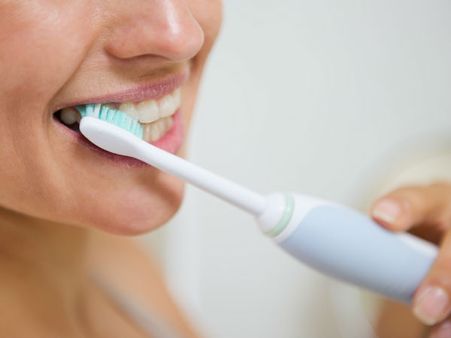Just In
- 6 hrs ago

- 9 hrs ago

- 9 hrs ago

- 12 hrs ago

Don't Miss
- Movies
 Siren OTT Release Date And Platform: When And Where To Watch Jayam Ravi's Movie Online
Siren OTT Release Date And Platform: When And Where To Watch Jayam Ravi's Movie Online - Sports
 Who Won Yesterday's IPL Match 32: GT vs DC, IPL 2024 on April 17 - Delhi Capitals Annihilate Gujarat Titans
Who Won Yesterday's IPL Match 32: GT vs DC, IPL 2024 on April 17 - Delhi Capitals Annihilate Gujarat Titans - Finance
 1:2 Stock Split: Record Date On April 24; Buy The Scrip Now To Be Eligible?
1:2 Stock Split: Record Date On April 24; Buy The Scrip Now To Be Eligible? - News
 Delhi Capital's Captain Rishabh Pant Gathers Praise For His Wicketkeeping Skills, Stunning Catch
Delhi Capital's Captain Rishabh Pant Gathers Praise For His Wicketkeeping Skills, Stunning Catch - Education
 SCCL Recruitment 2024; Application process, Selection criteria and more
SCCL Recruitment 2024; Application process, Selection criteria and more - Automobiles
 Mahindra 3XO SUV Latest Teaser Reveals Connected Car Tech: All Details Here
Mahindra 3XO SUV Latest Teaser Reveals Connected Car Tech: All Details Here - Technology
 OnePlus 13 Early Leak Hints at a Revamped Camera Island, and Fast Charging to Remain at 100W
OnePlus 13 Early Leak Hints at a Revamped Camera Island, and Fast Charging to Remain at 100W - Travel
 From Coconut Breaking on Head to Men Dressing as Women: 12 Unique Indian Rituals Explored
From Coconut Breaking on Head to Men Dressing as Women: 12 Unique Indian Rituals Explored
Did You Know That Your Toothpaste Can Make You Sick
Do you brush your teeth twice regularly? If yes, then are you sure your toothpaste is safe? An honest answer for most of us will be 'No', as most of us buy toothpaste according to the brand name and the impressive advertisements usually.

The toothpaste you use every day, in the morning and in the night (I hope you do) can affect your health negatively. The conventional toothpaste contains added harmful chemicals, which are used with the purpose of making the product more presentable and suitable for use [1].
Now, you must be thinking that how come a toothpaste can make one sick, as it is just thrown out of the mouth once the teeth are brushed and not swallowed, right? Yes, it is true that we spit it out, but the harmful chemicals present in the toothpaste can still enter your body and reach the blood, where it can cause further damage to the body organs.
When we brush our mouth using toothpaste, the chemicals present in the paste can cross the skin of the oral cavity (mouth) and from there enter the body [2]. These chemicals have the potential to enter the blood through the skin of the mouth and start getting accumulated in the body and cause certain side effect in time [3].

How Can Toothpaste Negatively Affect Your Health?
Toothpaste is nothing but a mix of various chemicals that help brighten your smile (and improve your oral health). However, not all the chemicals used in these tubes of toothpaste are good for your health. Let's take a look at the type of chemicals in toothpaste that can impact your health - so the next time you buy your tube of toothpaste, you know which ingredient to look out for.
Triclosan: An antibacterial chemical, triclosan is marketed with the claim that it helps fight gingivitis [4]. But, triclosan affects the antibiotic resistance of your body and fuels up the endocrine disruption, which can lead to a wide variety of health problems ranging from bone malformation to rare chances of cancer development [5].
Sodium Lauryl Sulfate (SLS): Also known as Sodium lauryl ether sulfate (SLES), this chemical breaks the phospholipids on your tongue, resulting in an enhancement of bitter tastes. This is the reason why everything tastes so bad right after you've brushed your teeth [6].
Artificial Sweeteners: Aspartame that is used to sweeten toothpaste is made up of aspartic acid and phenylalanine [7]. Phenylalanine breaks into methanol when used; however, our body cannot break down methanol into a harmless form known as formic acid. So, methanol poisoning can have fatal health effects on the body [8].
Fluoride: The chemical can cause neurological and endocrine dysfunctions in our body. Children who swallow a large amount of the paste while brushing can be at risk of developing disfiguring dental fluorosis [9]. Excessive exposure to fluoride can lead to tooth discolouration and bone problems [10].
Propylene Glycol: It is a type of mineral oil with industrial grading. It is used in antifreeze, paints, enamels, and aeroplane deicers. It can cause skin, eye, and lung irritation. Propylene glycol may even lead to organ system toxicity [11].
Diethanolamine (DEA): DEA found in many kinds of toothpaste can cause hormone disruption. It can react with other ingredients to form NDEA (N-nitrosodiethanolamine) [12]. NDEA is a carcinogenic chemical and has been linked with cancers of the stomach, oesophagus, liver, bladder, etc. It is also known to have caused organ system toxicity [13].
Formaldehyde: Many brands of toothpaste contain formaldehyde, a common preservative that halts the decomposition process in decaying organisms [14]. Yes, it is used as an embalming fluid for dead specimens. Small amounts of formaldehyde in toothpaste kills bacteria in the mouth, however, high amount of this agent can lead to diseases like tooth decay, jaundice, kidney damage, liver damage etc. [15].
Paraffin:
The
smooth
texture
of
your
toothpaste
is
due
to
the
presence
of
paraffin
[16].
It's
a
misconception
to
use
a
large
amount
of
toothpaste
and
brush
for
a
longer
time
to
enhance
oral
health.
Researches
have
proved
that
concentration
of
paraffin
may
lead
to
teeth
patches,
abdominal
pain,
nausea
and
constipation
[17].
Glycerin
Glycol:
Do
you
feel
nauseated
while
brushing
sometimes?
This
is
due
to
the
presence
of
Glycerin
glycol.
This
toothpaste
ingredient
is
used
to
keep
the
toothpaste
from
getting
dry.
It
is
addictive
and
causes
nausea
[18].

How Does Your Toothpaste Affect Your Health?
These aforementioned chemicals can affect your health in several ways and trigger health problems. Have a look at the diseases that can be caused by the use of toothpaste with harmful chemicals.
Thyroid Issues: The presence of triclosan in your tube of toothpaste can cause thyroid issues, heart problems and cancer [19].
Brain, Kidney & Heart Problems: Conventional toothpaste also contains a substance known as polyethene glycols (polyethene), which is nothing but the common plastic. This chemical is toxic for the body and can damage the brain, kidneys and heart [20][21][22].
Decreased IQ In Children: Toothpaste also contains a common chemical known as fluoride, which damages the gums, decreases the IQ in children; and if used by pregnant women, it can cause thyroid issues, bone damage and stomach problems [23][24].
Mouth Ulcer & Hormone Imbalance: There is a substance added in the toothpaste that acts as a soap, known as sodium lauryl sulphate. This substance causes mouth ulcers, skin irritation and hormonal imbalance [25].
Gas & Bloating: Tubes of toothpaste also contain a sugary substance known as sorbitol, which is hard to digest and metabolised by the body [26]. This can cause diarrhoea, indigestion, gas and bloating in the body. Sorbitol also decreases fat absorption in the body [27].
Diabetes & Weight Gain: Toothpaste contains aspartame (artificial sugar) and research has shown that this zero-calorie sugar has been linked to an increased risk of diabetes and obesity [28][29][30].

On A Final Note…
Choosing the right kind of toothpaste is critical. Although it may seem like a silly task, health experts and doctors imply the importance of spending an extra minute in choosing the right tube of toothpaste for you and your family, which can help avoid several diseases in the future.
-
 healthAre There Cancer-Causing Chemicals In Your Toothpaste? What You Need to Check Before Buying It
healthAre There Cancer-Causing Chemicals In Your Toothpaste? What You Need to Check Before Buying It -
 improvementDIY Toothpaste Tricks To Keep Your House Clean
improvementDIY Toothpaste Tricks To Keep Your House Clean -
 healthDid Cancer Exist Before Man-Made Chemicals Were Around To Create It?
healthDid Cancer Exist Before Man-Made Chemicals Were Around To Create It? -
 wellnessHair-Straightening Products May Cause Uterine Cancer, Study
wellnessHair-Straightening Products May Cause Uterine Cancer, Study -
 healthChemicals In Beauty Products May Harm Women's Reproductive Hormones, Says Study
healthChemicals In Beauty Products May Harm Women's Reproductive Hormones, Says Study -
 pulseHere's Why Mixing Cleaning Detergents And Bleach Can Kill You
pulseHere's Why Mixing Cleaning Detergents And Bleach Can Kill You -
 wellness12 Health Benefits Of Organic Food
wellness12 Health Benefits Of Organic Food


 Click it and Unblock the Notifications
Click it and Unblock the Notifications



